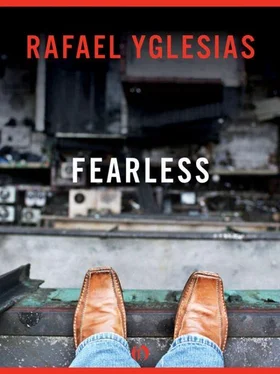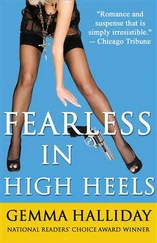“I’m going bed,” he said.
He ran away from her — too quickly — until a man’s hand stopped him. Bubble took the hand. It belonged to Max. He smiled back at her.
“I’ll get him home safe,” Max said.
Everything was going to be all right, she knew. She tried to tell Max she understood but her mouth still couldn’t make sound.
Max led Bubble away. Bubble was pleased to be with him. Hand in hand they walked off the green earth into pale sky.
After nine days in the hospital Max’s head still ached — at least dully — all the time. And he felt dizzy if he walked more than a few steps. He couldn’t see that well either. Everything in his room seemed to have been covered in cellophane and out his window the world looked foggy even when the sun shined. They said his vision would clear up; but he was worried.
When he first regained consciousness, in the dimmed agony he could feel through the fever, drugs, and mental confusion, he regretted what he had done. Later in the week, though, when Carla came to see him, he didn’t. She had recovered herself. Her eyes were bright and her thin body had energy, almost too much energy. Her darting movements — from the side of his bed to the tray to get him something — made his head hurt. She talked nonstop, too, about how she had finished packing Bubble’s room, giving the stuff away to the Church, how she had visited his grave with her mother and afterwards they had kissed and made up for all their crazy arguments of the last six months. “Poor Mama,” Carla said. “I sent her home to be with her new husband. She’s had no time to be with him. I can’t believe how patient she was with me.”
Max enjoyed the lively talk of her awakening — as long as she kept still. When others visited their speeches hurt even if they did keep still, because he had to remember things. It seemed that to remember used the bruised part of his brain; listening to Carla’s present life required a section that had gone unscathed. The painless present, he called it, and discouraged visits from the past, especially his former office staff, his friends, his mother and sister, Debby’s relatives and even Debby herself.
Debby was furious with him, anyway, and probably didn’t want to stay much longer than her daily hour-long visits. She made no recriminations the first few days until Max had stabilized. On the fourth day she sent Jonah to the waiting room with his grandfather. She settled by the window — her back erect, her eyes as alert as a cat waiting for prey — and made a speech. Her long face was composed, her profile backlit by the gray winter light. He couldn’t see her features distinctly at that distance. The fuzziness acted as a flattering camera lens — she looked as young as when they first met.
“I’ve had a long talk with Bill Perlman.”
“Another one?” Max said.
Debby ignored him. “He told me to stop treating you with kid gloves. I’ve been scared to just say what I—”
“Say what you want,” Max said. It would be a relief to hear her anger. Let the worst happen: it wasn’t as terrible as he once thought.
Debby cleared her throat. “I know you think there’s nothing wrong with you since the plane crash. But there is something wrong. Terribly wrong. You don’t seem to want to live anymore. At least not with me. And you don’t want to do any of the things that we used to do together. You don’t want to work, you don’t want to make love, you don’t want to…be with me. You don’t even want to go to the movies with me. You can’t even bear to sit in the dark next to me doing nothing…” She dropped her head. It was an elegant movement: only her chin and face fell; her long neck remained straight. She was a grief-stricken swan. “Jonah feels you don’t want to be with him.”
Max’s nose had been broken in the crash. It was an afterthought for the doctors and a secondary pain for Max. Yet the bridge of his nose throbbed from time to time and it did then. He wondered if the pulsing signified his body was healing. The doctors hadn’t done much for his broken nose: a tape, running across from one cheek to the other, held what there was in place.
“Of course something is terribly wrong,” Max said in a moment, once the throbbing stopped.
“Why won’t you see your shrink? Or any shrink. You can’t tell me you’re happy. You used to go to a shrink when you were happy. Why don’t you go now when you really need help?”
“I needed help to be happy,” Max said. “I don’t need help to feel sad.”
Debby twisted violently in her chair and banged the hospital’s metal radiator cover with her foot — it was a sharp stunning movement for someone usually deliberate and graceful. “Damn it, Max! What the fuck are you talking about?” she turned toward him as she rose from the chair. He wasn’t sure, but she seemed to have tears in her eyes. “You tried to kill yourself! How the fuck can you say you don’t need help.”
Of course she was right to be furious: he had given up his end of the bargain, thrown out the contract of their relationship. Why couldn’t she see that she didn’t love him, she loved the faker who pretended to care only about her happiness? He had wanted to be her savior, the compensation for the art she had lost. But really he was a transitional object, a teddy husband, a comfort, not a joy. “I guess — I guess—” he began but he had to stop because of a blinding pain that came across the top of his skull and radiated down to his nose. He actually saw white stars float across the room. He shut his eyes and waited for the pain to pass. He said finally, “I guess you won’t believe me, but I didn’t try to kill myself. I have no intention of dying.”
Debby was back in the chair. He hadn’t seen her move there. She was folded over, her head draped down below her knees. He envied her ability to make art instantly with her body. An art without compromise. “You did it for her,” she said in a mumble to the floor.
“It just came to me. I knew what had to be done. I knew it with Byron also. We all lived through death together and I seem to know how they should live. It’s the first time in my life,” and he discovered he was crying, “that I feel talented.”
His nose stung from the tears. He shut his eyes and swallowed tears. He was floating on the bed. He tried to remember sitting in the plane waiting for the crash, but it wasn’t there. His head hurt instead.
“How did you help Byron?” he heard Debby ask. “By hitting him?”
“No,” Max said and didn’t elaborate. He knew that to her everything he did was crazy. To her, his real self — which he had finally revealed to her — was frightening and mad. He had dimly felt that was the case all along in their marriage; but he had wanted her love and admiration so much that he was willing to live in hiding. “Ask Jonah to come in, okay?”
“Why?” she was on her feet, moving soundlessly and gracefully across the room. He guessed she was pacing; her fluid walk had no tension, however.
He couldn’t face eternity living a lie. He couldn’t die a shadow man.
“What are you going to say to him?” Debby insisted, wandering all the way to the open doorway of the bathroom. “I don’t want you scaring him.”
This made Max angry. He knew she was off balance and not to be held accountable; and yet what right did she have to control what he might say to his son? Concussion or no, Max was still shrewd; he didn’t show his annoyance. He said softly, “First you say I don’t want to spend time with him and then you don’t want me to spend time with him.”
Debby nodded to herself. She turned to the wall and leaned her head against it. “Damn,” she said quietly.
“You can stay and listen,” Max offered. “It’s not a big deal — I just want to talk to him for a minute.”
Читать дальше












